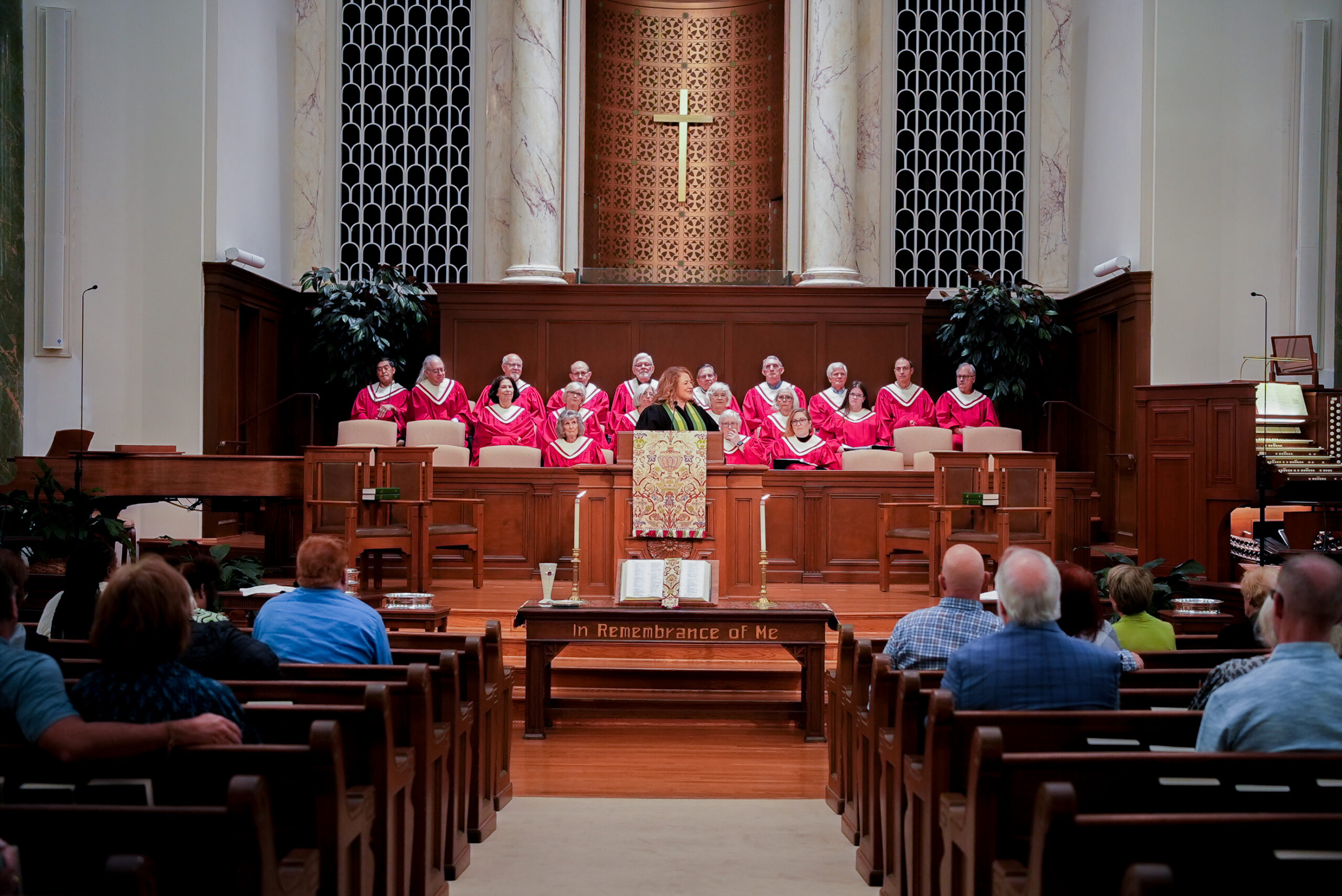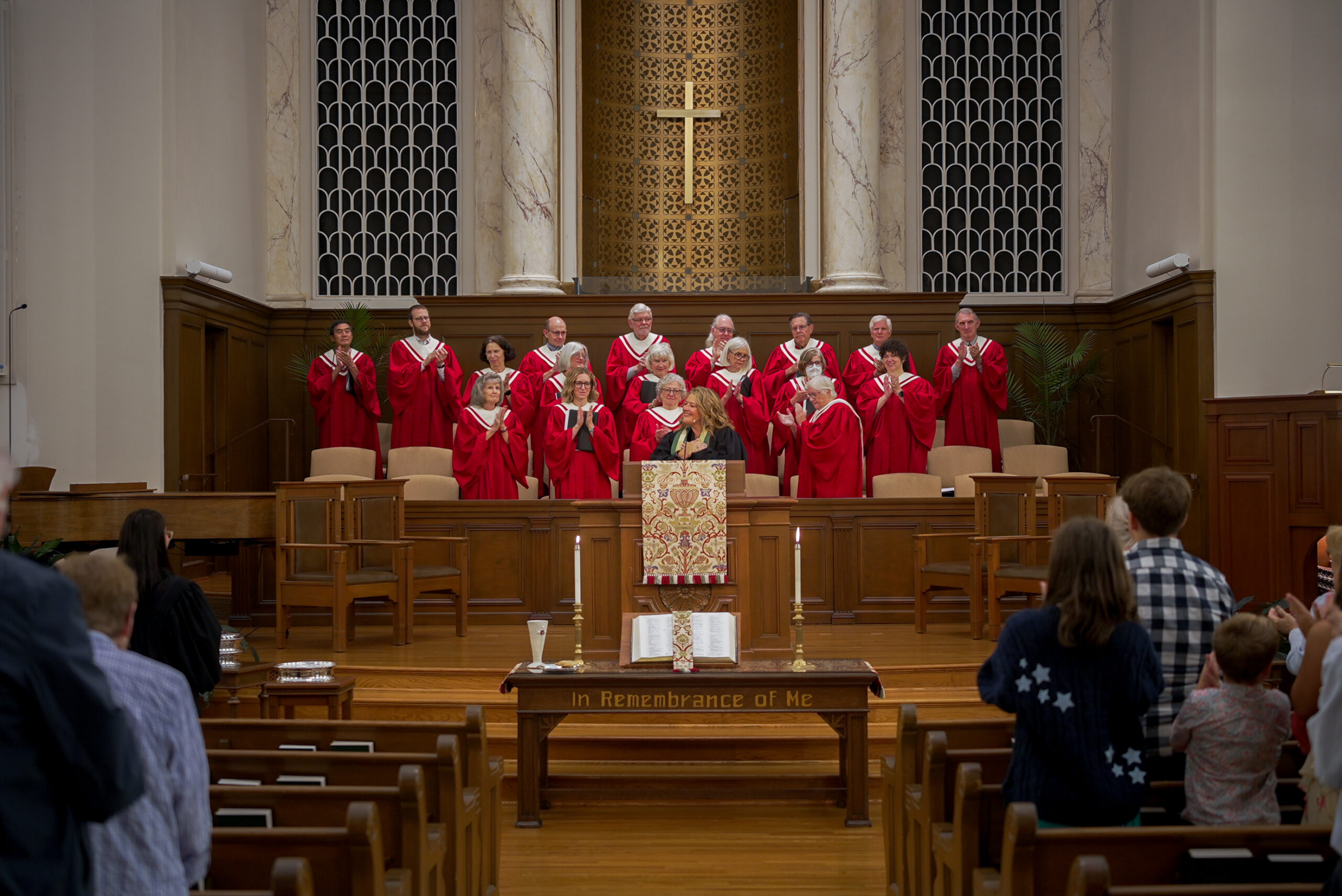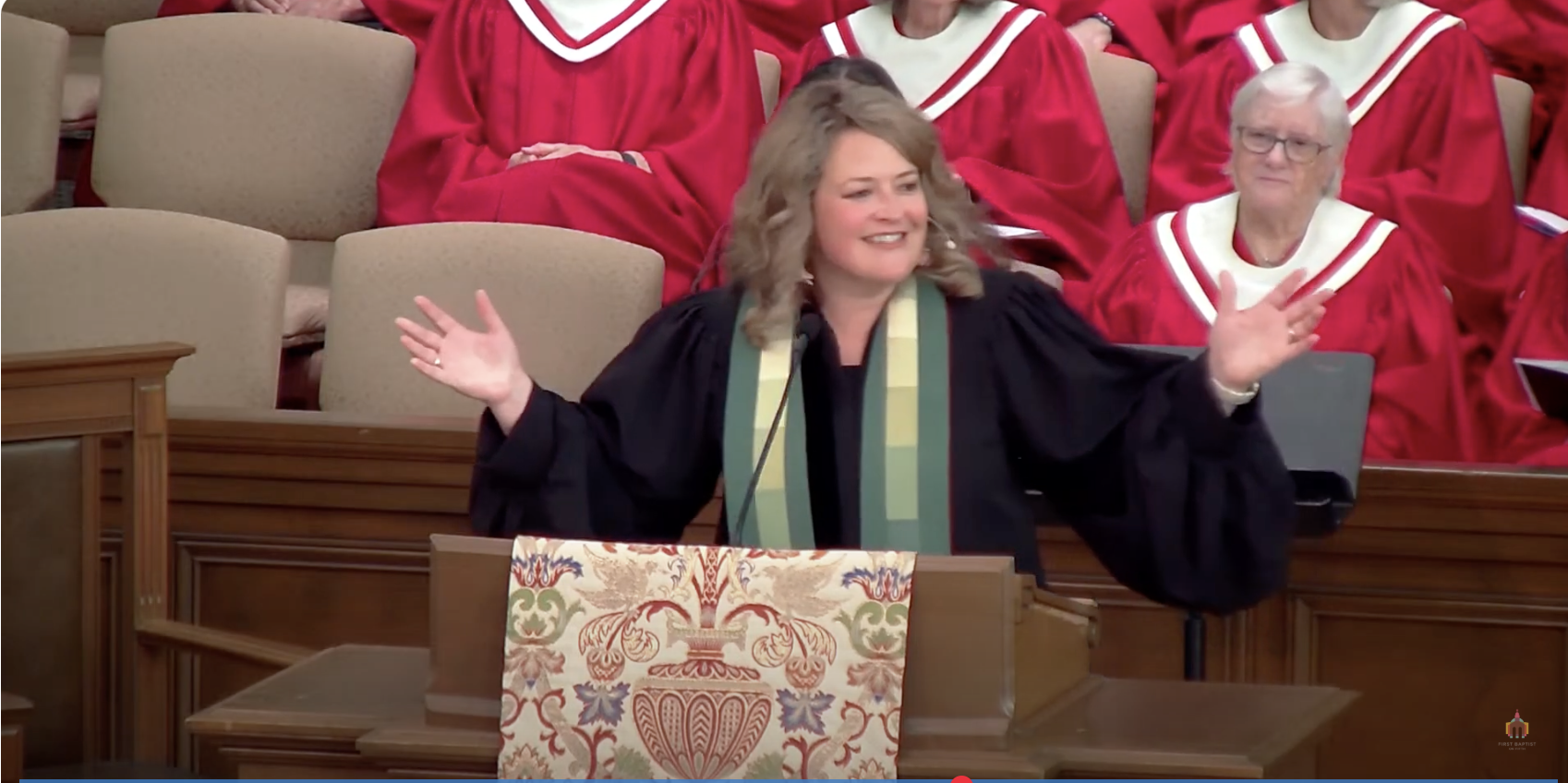I.Have you heard the story about the guy who loses his keys? There’s a guy… and he loses his keys! He’s looking and he’s looking and he’s looking for his keys, and he just can’t find them. Another guy comes up and he says, “What are you doing?” He says, “I lost my keys.” And the guy says, “Where were you the last time you saw your keys?” And the guy says, “About a block down the road.” And the guy says, “well why are you looking here?” And he says, “Because the light’s better.”1
Eric Peterson shared this story with me, and I love both what it says and what it means. The guy was looking where it was easy to look, but not where he was likely to find. The parallels with our lives practically write themselves, don’t they? We go looking for approval on social media, and find likes instead of love. We look for security in our savings accounts, and find scarcity instead of stability. We look for safety in our locks and gates, our weapons and our boundaries, and find more to be afraid of instead of immunity from what scares us in the first place. We look for agreement in our divided places, and find watered-down, inauthentic, lowest-common denominator consensus instead of particularity, authenticity, and a chance to rise above. We look for the missing piece in our Amazon cart, or an extra hour of work, or a relationship we try to keep quiet, and find raw, perpetual scarcity instead of the abundance for which we were hoping. We look for saviors in our politicians, our churches, our institutions, our laws, and find… well, flawed human beings sometimes doing the best they can do with what they have, sometimes taking advantage of what is for the sake of what could be, all instead of that which liberates and gives life.
Bless our hearts. But you know, we who say we want to follow in the way and the truth and the life of Jesus have a choice. We can keep the me we know, or we can discover the me we’re becoming. We can confuse death with the end, or remember that to Jesus, death can, does, continues to find life in the deadest of places. We can resist, reject, refuse the invitation to lose, or we can admit the truth we know deep down and discover all that we’ll find. So occupied are we with looking in all the wrong places that when Jesus cuts through the noise with an invitation, will we stubbornly refuse it? The hour has come – what will you do?
II.It’s the fifth Sunday of Lent, which means that by now, we’re getting closer with Jesus in each passing day to the cross. By this point in the narrative, the tension is high. Jesus has been raising eyebrows among the religious elite for months – healing, performing signs and wonders, challenging the way things were – but until now, he said, “the hour had not yet come.” Yet at this point, the calculus has changed. The hour for Jesus has, indeed, come. So why might that be?
Just before our passage opens, we hear the story of Jesus raising his friend Lazarus from the dead, doing the very thing that seemed impossible to all. Because of this action, John tells us, “many believed.” And to a collection of religious and political power-brokers, this threat to their authority and grip was a threat that had to be eliminated. From this moment, they openly plot his death.
Let’s note too the context around Jesus. It’s now Passover, the holy season where Jews come to Jerusalem for the high holy days. Jesus’ popularity is rising and spilling out past expected boundaries. He’s gone viral, if you will. Even the Greeks want to see Jesus! No longer is he simply changing perception in his own tradition, he’s now pressing into another. John tells us that some Greeks came to Philip, who took their request to Andrew, and then from them to Jesus. The world is at Jesus’s doorstep, and the “keepers of the way things are” were rattled. Scholar Beverly Gaventa explains this, saying, “The ‘hour’ arrives because opposition to Jesus reaches its inevitable outcome: the officials will seek his death. But the ‘hour’ also arrives because of Jesus’ very ‘success’ with the world… The world is a thoroughly unreliable place; neither its hostility nor its adoration can be trusted.”2
Perhaps Jesus sensed those shifting sands beneath him. “Very truly I tell you,” he says, “unless a grain of wheat falls to the earth and dies, it remains just a single grain; but if it dies, it bears much fruit. The ones who love the kind of life this world gives will lose the life they seek, but the ones who let go of their life in this world and follow my ways will find the life of the world to come that never fades away, full of beauty and harmony.”
III. It is said that in the St. Paul’s Monastery on Mount Athos in the northeastern peninsula of Greece, there stands a sign that reads: “if you die before you die, you will not die when you die.”3 As it is with seeds of grain dying before bearing fruit, with transformation of ourselves or our communities, death must precede life in order for there to be life. These type of enigmatic statements don’t just mark walls of monasteries, they pepper the ministry of Jesus: statements that call forth the reality that we must say no before we can say yes, be blind before we can see, give up what is now in order to gain what is not yet, exhibit power made perfect in weakness, lose their lives now in order to find and keep them forever. These are the kind of words spoken by one who knows what lies ahead, one who knows his hour has arrived, one who knows the cross he will have to bear, one who knows it is his body that will soon be planted in a tomb. For you and I both know now what Jesus knew then: that before we get to Easter Sunday, we have to go through the depths of Good Friday. What will that hour demand of you and me?
And so I wonder — what is the hour to which you have come? What decision stands before you that demands a level of surrender you instinctively know you must yield but you’re just not sure if you can give? What grains of your life as you know it and love it must die, lest in adoring your life and all its trappings — your money, your schedule, your relationships, your appearance, your plan — you lose it?4 What purposeful turning towards Jesus nudges you to some form of death in order that you might gain life? What crosses must you take up and bear into the systems of this world, systems of racism and sexism, consumerism and individualism, systems holding us captive to that which we don’t even realize is taking our very lives? And we ask of ourselves – what is the hour to which we have come together? Where is our country searching for our proverbial keys far from where we’ll find them? Where is our culture unwilling to let go of what’s killing us for fear of what will fall? Even closer to home, where is Jesus inviting our church to open our hands with what we grasp and trust the seeds that will fall, and plant, and grow, and nourish someday beyond what we can see?
IV.I’ve told you before the story of the “Farminary” at Princeton Seminary. You see, back in 2010, Princeton Seminary purchased a plot of land from a Christmas tree farmer, who himself had purchased the land some 15 years prior from a sod farmer. For decades, that land had been used to generate the “crop” of sod, where over a 14-month period, grass seeds grow forth into a lovely lawn. Then a large sod-harvesting machine peels back the grass from the ground, almost like you might peel skin from an apple or a potato. That grass then is taken all around – to suburban homes, football fields, you name it – wherever one needs an instant lawn.
For decades, this plot of land in Princeton, New Jersey had produced yards and yards of yard! But each and every time that machine would pull up a roll of grass, a little bit of the topsoil would come off with it, slowly but clearly depriving the ground the very nutrients and fertility it needs to be a source of abundance. My friend Nathan Stucky is the director of the Farminary, and describes the work, then, of the Farminary to “restore vitality to the soil.” Where once industrial forces stripped the land of its fertility, a motley crew of seminarians practice the patient and persistent work of composting, what Nathan calls “the gateway to new life,” taking that which has died and using it to breathe a holy breath into this valley of dry land. Where once the ground was valued simply by what it could produce, the Farminary seeks to make this land the most vital in Mercer County, reconnecting the ecosystem of plant and people, land and living things, communion with community that bears witness to new life.
And in so doing, the Farminary speaks prophetically to the churches its seminarians will one day serve, reminding Christ-filled communities that we have been given the promise of resurrection! No longer must we cling to the way things have always been, no longer must we measure the success of our churches merely by what they can produce, no longer must our churches strip and squeeze resources out of a depleted landscape, no longer must we refuse the invitation of death for fear of perishing. For we are Easter people, people of abundance and new life and resurrection!
I was so inspired, that I’m pretty sure I was ready to get out my gardening gloves and find a trowel, when Nathan told me about a student of his. “I’ve heard Nate tell the story of the sod farm probably eight times,” she
said to the class, “but in light of graduation and my applications for church jobs, I heard it differently today. Because I’ve interviewed with too many churches who have been farming sod for decades, and what they want me to do is come and help them be successful sod farmers.”5
V.Siblings in Christ, what is the hour to which you have come, and where is Jesus beckoning you to go? Perhaps for you that hour is the decision that has nagged at your heart for years, a decision to commit your life fully to follow in the way of Jesus. Or maybe for you the hour has come to finally stop looking in the wrong place and face your addiction – put down the bottle, the mirror, the phone, the pace of your living, whatever for you becomes the thing or the habit you quickly look to fill whatever hole or wound you have, so that instead you can follow Jesus in his way of abundant life. For you, perhaps the hour has come to lay aside your fear of knowing the outcast, the lowly, the marginalized, the different, so that instead you can follow Jesus in his way of love. Or maybe for you the hour has come to speak where you too long have been silent or to listen where you too long have been loud, to march when you too long have been motionless or to rest when you too long have been roused, so that instead you can follow Jesus in his way of courage. No matter the hour, the invitation is clear. Jesus says, “whoever serves me must follow me.” That means following Jesus in the way of abundant life, the way of love, the way of courage, the way of God. Following Jesus doesn’t mean making a one-time decision, forming all your opinions and perspectives, and then staying still, holding fast, hunkering down, and defending the cause. No! Following Jesus demands movement, actively journeying from where you’ve been to where you’ll go. Following Jesus expects that you will change and grow, that the seeds of the gospel planted deeply within you will germinate and break through the hard winter’s ground, that they will stretch towards the sun and bend with curiosity to the world around, that they will flower and bear fruits of love, joy, peace, patience, kindness, generosity, faithfulness, gentleness, and self-control. Following Jesus urges you to be willing to leave behind the world and the worldview you’ve so carefully cultivated to ‘come and see’ what life might look like on the other side.
VI.“My soul is troubled,” Jesus cries, “Should I say, Father, save me from this hour? No, it is precisely for this reason that I have come to this hour.” Friends, we can keep the life we know, or we can follow Jesus into the life of the ages. We can’t do both. The hour has come. What will it be?










